Dried Vegetables Powder
Onion powder:
Onion Powder is a versatile ingredient made from finely ground dehydrated onions. Let’s explore its uses, benefits, and nutrient value:
- Uses of Onion Powder:
- Seasoning: Onion powder is commonly used as a seasoning in various recipes around the world. It enhances the flavor of dishes like soups, stews, dressings, and marinades.
- Substitute for Fresh Onions: When you’re short on time or don’t have fresh onions, onion powder is an excellent substitute. One tablespoon of onion powder is roughly equivalent to one medium-sized onion.
- Meat and Veggie Dishes: It pairs well with meat recipes (chicken, beef, pork, lamb) and roasted vegetables.
- Health Benefits of Onion Powder:
- Boosts Immunity: Onion powder contains antibacterial, antiseptic, and antimicrobial properties, helping to prevent infections.
- Treats Cough and Cold: Rich in antibiotics and anti-inflammatory compounds, it’s beneficial for cold, cough, and flu symptoms.
- Heart Health: Onion powder’s antioxidants may reduce the risk of heart problems.
- Bone Strength: Contains compounds associated with improved bone health.
- Low in Calories: Onion powder is low in calories, fat, and sodium.
- Nutrient Value of Onion Powder(per teaspoon):
- Calories:
- Fat: 0.03g
- Carbohydrates: 1.94g
- Protein: 0.24g
- Vitamins and Minerals: Contains vitamin B, vitamin C, manganese, calcium, iron, and potassium. Remember, onion powder adds flavor without the tears!
Cucumber Powder and Gherkin Powder:
Cucumber Powder:
- Uses:
- Flavoring: Cucumber powder is versatile and can be added to various recipes, including salad dressings, soups, sauces, couscous, and dips. It imparts a delightful cucumber flavor to dishes.
- Natural Skincare: Cucumber powder is popular in beauty products due to its astringent properties. It can help reduce redness and inflammation, and tighten pores. The cooling effects soothe sensitive or irritated skin while providing hydration.
- Health Benefits:
- Nutrient-rich: Cucumber powder contains essential vitamins and minerals, including vitamin K, vitamin A, vitamin C, potassium, and manganese. It’s also a good source of dietary fiber.
- Antioxidants: Cucumbers are rich in antioxidants that combat harmful free radicals. These compounds may help reduce the risk of chronic illnesses.
- Hydration: With its high water content, cucumber powder contributes to overall hydration.
- Nutrient Value(per half cup of sliced cucumber with peel):
- Calories: 8
- Carbohydrates: 1.9g (including 0.3g of fiber and 0.9g of natural sugar)
- Protein: 0.3g
- Vitamins: Vitamin K (8.5mcg), Vitamin C (1.5mg)
- Minerals: Potassium (76.4mg), Magnesium (6.8mg)
- Low in Fat: Only 0.1g of fat.
Mushroom Powder:
- Health Benefits of Mushroom Powder:
- Immune System Support: Mushroom powder contains beta-glucans, which stimulate the immune system and enhance its response to infections.
- Antioxidant Properties: Mushrooms are rich in ergothioneineand selenium, both powerful antioxidants that protect cells from oxidative damage.
- Anti-Inflammatory Effects: Certain mushroom varieties, such as shiitakeand reishi, have anti-inflammatory properties that may benefit overall health.
- Vitamin D: Some mushrooms, when exposed to sunlight or UV light, produce vitamin D. Mushroom powder can be a source of this essential vitamin.
- Nutrient Value of Mushroom Powder(per 100 grams):
- Calories: Approximately 300 kcal
- Protein: Around 20 grams
- Carbohydrates: About 50 grams
- Dietary Fiber: Roughly 30 grams
- Vitamins and Minerals: Mushroom powder contains vitamin B complex, vitamin D, iron, potassium, and zinc.
- Uses of Mushroom Powder:
- Culinary Applications: Mushroom powder can be sprinkled over dishes like soups, stews, sauces, and graviesfor an umami boost.
- Supplements: It’s available as a dietary supplement in capsule or powder form. Many people take it for its health benefits.
- Beauty and Skincare: Mushroom extracts are used in skin care products due to their potential anti-aging and skin-soothing effects.
Remember, mushroom powder is a versatile ingredient that not only adds flavor to your meals but also provides a host of health benefite
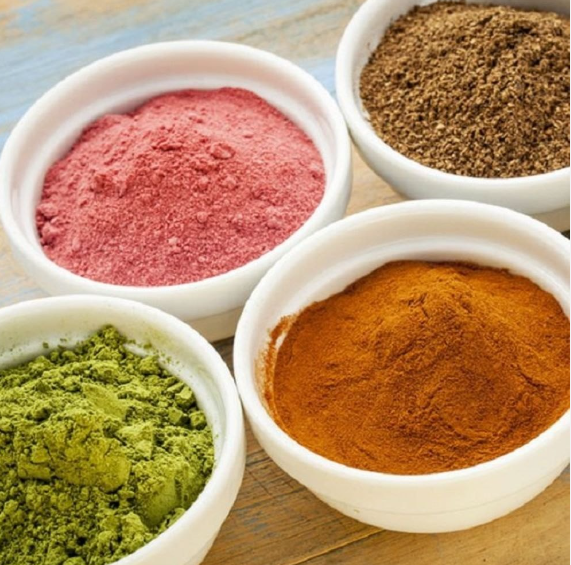
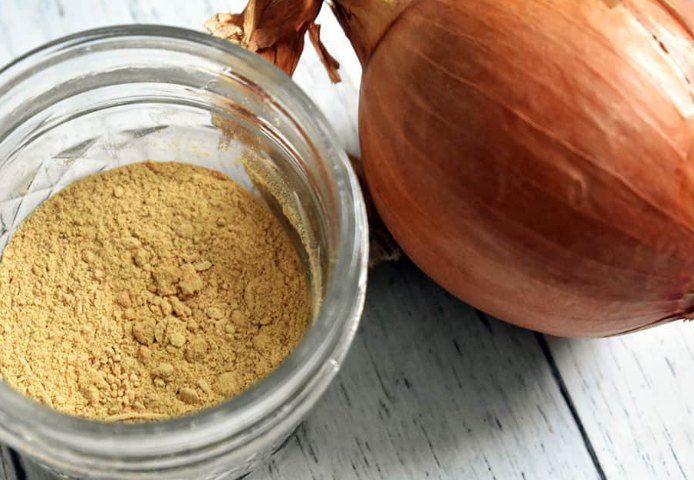
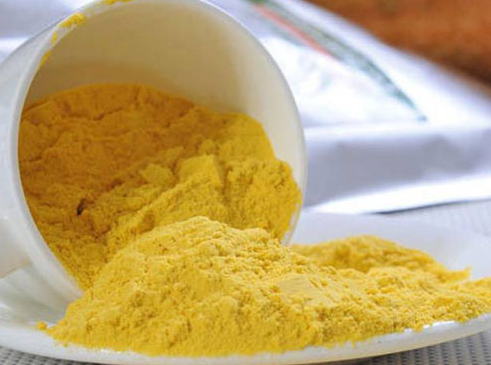
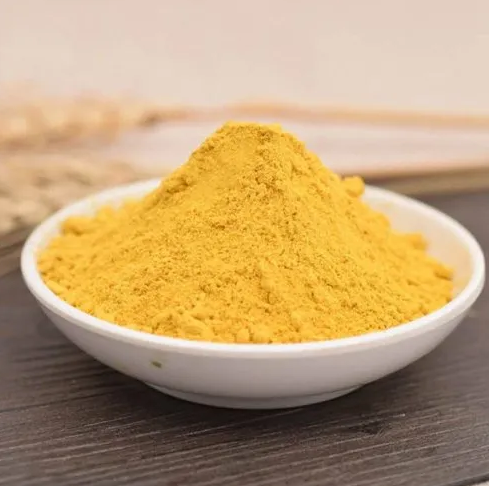
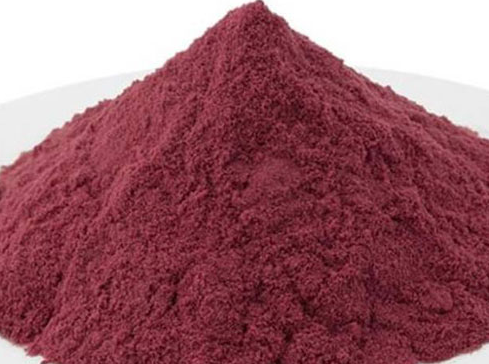
Green Pepper Powder: A Flavorful Spice
- Uses of Green Pepper Powder:
- Flavor Enhancer: Green pepper powder is made from dried and finely ground green bell peppers. It adds a delicate background flavor with a mild zip to various dishes.
- Substitute for Fresh Peppers: Use it as a substitute for fresh green bell peppers in recipes where you want the flavor without the added bulk.
- Incorporate into Bread: Add 2 to 4 tablespoons of green pepper powder to yeast bread recipes for a unique twist.
- Seasoning for Eggs: Whisk it into scrambled eggs or sprinkle it on fried or poached eggs.
- Green Chile Sauce: Make a green chili sauce using green pepper powder when fresh roasted green chilies are unavailable.
- Health Benefits of Green Pepper Powder:
- Rich in Vitamins: Green pepper powder is a rich source of vitamins C and B6.
- Good for Gut Health: Its fiber content supports digestive health and may prevent conditions like colon cancer and inflammatory bowel disease.
- Eye Health: The vitamin A content helps maintain healthy eyesight and prevents night blindness.
- Anemia Prevention: The iron, along with vitamin C, aids in preventing iron deficiency.
- Nutrient Value(per 1 cup/150 grams of raw sweet green pepper):
- Calories: 30
- Protein: 1.3 grams
- Carbs: 7 grams
- Fiber: 2.6 grams
- Vitamin A: 3% of the daily value (DV)
- Vitamin C: 134% of the DV
- Vitamin K: 9% of the DV
- Potassium: 6% of the DV
- B6 (Pyridoxine): 20% of the DV
Remember, green pepper powder adds flavor without the heat, making it a versatile spice for your culinary creations!
Truffle Powder:
- Uses of Truffle Powder:
- Risotto: The subtle, flavorful notes of truffle powder work wonderfully in mushroom risotto.
- Potatoes: Enhance mashed potatoes, baked potatoes, or cut potatoes with the meat-like savor of truffle powder.
- Pasta: Add depth of protein-like taste to pasta dishes. Use it in sauces or as part of the seasoning for spaghetti or fettuccini.
- Eggs: Elevate scrambled eggs or omelets by incorporating truffle powder.
- Health Benefits of Truffles:
- Rich in Nutrients: Truffles are a complete source of protein, containing all nine essential amino acids. They’re high in carbs, fiber, and micronutrients like vitamin C, phosphorus, and iron.
- Antioxidant Power: Truffles are packed with antioxidants such as vitamin C, lycopene, and Gallic acid. These compounds may help reduce inflammation and even inhibit cancer cell growth.
- Antibacterial Properties: Desert truffles have antimicrobial properties and can inhibit the growth of bacteria like Staphylococcus aureus.
- Balancing Truffle Flavor:
- If the truffle taste is too intense for you, consider balancing it:
- Pair it with complementary flavors.
- Use it sparingly to avoid overpowering other ingredients.
- If the truffle taste is too intense for you, consider balancing it:
Remember, truffle powder adds a savory, umami-style flavor to various dishes, making them truly unforgettable.
Asparagus Powder:
- Uses of Asparagus Powder:
- Nutrient-Rich: Asparagus powder is a concentrated form of asparagus, rich in vitamins, minerals, and antioxidants.
- Flavor Enhancer: It can be added to various dishes, including soups, stews, salads, and more.
- Antioxidant Properties: Asparagus contains vitamin E, vitamin C, and polyphenols that help neutralize harmful free radicals.
- Potential Health Benefits: Research suggests that asparagus extract may have anti-inflammatory, antiviral, and anticancer effects.
- Nutrient Value of Asparagus Powder(per half cup of cooked asparagus, 90g):
- Calories: 20
- Protein: 2.2g
- Carbohydrates: 3.7g
- Fiber: 1.8g
- Vitamins and Minerals:
- Vitamin K: 57% of the RDI
- Vitamin A: 18% of the RDI
- Vitamin C: 12% of the RDI
- Folate (Vitamin B9): 34% of the RDI
- Potassium: 6% of the RDI
- Iron: Provides small amounts
- Zinc: Provides small amounts.
- Health Benefits of Asparagus:
- Antioxidant Power: Asparagus is high in antioxidants, including flavonoids like quercetin, which may have anti-inflammatory and anticancer effects.
- Digestive Health: Its dietary fiber supports digestion and regulates blood sugar and fat absorption.
- Low in Fat: Virtually fat-free, with essential polyunsaturated fats.
- Source of Protein: Provides enough protein to meet daily nutritional needs.
Remember, asparagus powder is not only nutritious but also versatile in enhancing the flavor of your favorite dishes!
Garlic Powder:
What Is Garlic Powder?
Garlic powder is simply garlic cloves that have been dehydrated and ground into a powder. It can be used as a seasoning just like any other spice. The key to unlocking its usefulness in the kitchen is to avoid comparing it directly to fresh garlic. Instead, appreciate it as a uniquely useful ingredient in its own right.
Nutrient Value of Garlic Powder (per 1 tablespoon):
Calories: 32.1
Carbohydrates: 7.1g (6.2g net carbs)
Fat: 0.1g
Protein: 1.6g
Vitamins and Minerals:
Vitamin C: 0.1mg (1% of the Daily Value)
Vitamin B6: 0.2mg (13% of the Daily Value)
Manganese: Essential trace mineral
Selenium: Essential trace mineral
Health Benefits of Garlic Powder:
Boosts Immune System: Garlic powder may help protect against illness, including the common cold 5.
Lowers Blood Pressure: Some studies suggest that garlic extract or powder could be helpful as a side therapy for cardiovascular disease and high blood pressure 6.
Antioxidant Properties: Garlic contains powerful antioxidants that combat oxidative damage 5.
Potential to Extend Life: Garlic’s health benefits may contribute to overall longevity 5.
Flavor Enhancement: Use garlic powder to season roast chicken, sprinkle on pizza, add to salad dressings, or incorporate into dipping sauces 1.
Remember, garlic powder is a flavorful and nutritious addition to your culinary creations!.
Potato Powder:
What Is Potato Powder?
Potato powder is made from dehydrated and finely powdered potatoes. The process involves peeling, washing, cooking, and then drying the potatoes. Various drying methods, such as hot air drying, freeze-drying, and drum drying, remove the moisture content, resulting in a lightweight, shelf-stable, and portable product. Potato powder can be rehydrated for a variety of culinary uses.
Uses of Potato Powder:
Thickening Agent: Potato powder effectively absorbs water and improves the consistency of dishes. It is commonly used as a thickening ingredient in: Soups, Sauces, and Gravies.
Gluten-Free Alternative to Flour: Being gluten-free, potato powder can replace flour in baking recipes. However, use it alongside other starches to avoid a dry, crumbly texture. Common baking recipes include: Muffins, Quick bread recipes, Gluten-free flour mixes
Fried Food Coating: Potato powder works well as a coating for fried foods such as chicken, fish, or vegetables. It provides a golden and crispy outer layer during frying.
Health Benefits of Potato Powder:
Resistant Starch: Raw potato starch contains resistant starch, which behaves similarly to dietary fiber. It passes through the small intestine undigested and ferments in the colon, feeding beneficial gut bacteria.
Improved Insulin Sensitivity: Some research suggests that resistant starch can enhance insulin sensitivity.
Nutrient Value of Potato Powder (approx. per 100 grams):
- Calories: 350-400 kcal
- Carbohydrates: 80-85 grams
- Protein: 6-8 grams
- Fat: 0.5-1g
- Fiber: 4-6g
- Potassium: 1000-1500 mg
- Vitamin C: 10-20 mg
- Calcium: 20-50 mg
- Iron: 3-5 mg 1
Potato powder is a versatile ingredient, ensuring consistent quality and flavor even in areas where fresh potatoes are scarce. Whether in commercial or home kitchens, it plays a crucial role in various dishes!
Dal Powders:
Green Gram Dal (Moong Dal) Powder:
- Uses and Benefits:
- Rich in Plant-Based Protein: Green gram dal powder is one of the richest sources of plant-based proteinin the world. It is available as a whole, split, and de-husked (yellow) form. Use it to make both sweet and savory dishes.
- Culinary Versatility: Green gram dal is widely used in Indian cuisines. It melds well with other ingredients while retaining its wholesomeness. It serves as a comforting food for those recuperating from illness due to its easy digestibility.
- Skin Benefits: Green gram dal powder, when blended with yogurt, can be applied to the face to combat the effects of harmful UV rays and soothe the skin.
- Nutrient Value(per 100 grams of green gram dal):
- Dietary Fiber: 15.5 grams (meets 70% of daily recommendati
Horse Gram Dal Powder:
- Health Benefits:
- Diuretic Properties: Horse gram dal has been traditionally used as food medicine for treating various ailments, including diabetes, arthritis, ulcers, cholesterol, asthma, and anemia 2.
Remember, dal powders are not only nutritious but also versatile ingredients that enhance the flavor of your meals!
Green Gram Dal (Moong Dal) Powder:
- Uses and Benefits:
- Rich in Plant-Based Protein: Green gram dal powder is one of the richest sources of plant-based proteinin the world. It is available as a whole, split, and de-husked (yellow) form. Use it to make both sweet and savory dishes.
- Culinary Versatility: Green gram dal is widely used in Indian cuisines. It melds well with other ingredients while retaining its wholesomeness. It serves as a comforting food for those recuperating from illness due to its easy digestibility.
- Skin Benefits: Green gram dal powder, when blended with yogurt, can be applied to the face to combat the effects of harmful UV rays and soothe the skin.
- Nutrient Value(per 100 grams of green gram dal):
- Dietary Fiber: 15.5 grams (meets 70% of daily recommendation)
- Antioxidants: Contains phenolic acids, flavonoids, caffeic acid, and cinnamic acid.
Horse Gram Dal Powder:
- Health Benefits:
- Diuretic Properties: Horse gram dal has been traditionally used as food medicine for treating various ailments, including diabetes, arthritis, ulcers, cholesterol, asthma, and anemia 2.
Remember, dal powders are not only nutritious but also versatile ingredients that enhance the flavor of your meals!
Fenugreek leaf powder:
Fenugreek leaf powder is derived from the fenugreek plant (Trigonella foenum-graecum), offers a range of health benefits. Let’s explore its uses, advantages, and nutritional value:
Uses and Benefits of Fenugreek Leaf Powder:
Breast Milk Production:
Fenugreek is traditionally used as a galactagogue to increase breast milk supply in breastfeeding mothers.
Research suggests that fenugreek tea or supplements can enhance milk production, allowing babies to gain more weight.
Blood Sugar Control:
Fenugreek may help lower blood sugar levels in people with diabetes.
Adding fenugreek powder to hot water or incorporating it into bread recipes has shown positive effects on blood sugar levels.
Menstrual Cramp Relief:
Some studies indicate that fenugreek seed pills or tea can reduce menstrual pain and cramps.
Women who consumed fenugreek tea reported better pain management during menstruation.
Nutrient Value of Fenugreek Leaf Powder (per 100 grams):
Calories: 50
Carbohydrates: 58 grams
Protein: 23 grams
Fat: 6 grams
Iron: 186% of the Daily Value (DV)
Manganese: 6% of the DV
Magnesium: 5% of the DV
Remember, fenugreek leaf powder is a versatile ingredient with potential health benefits. Incorporate it into your diet wisely!
Curry Leaf Powder:
Curry Leaf Powder is derived from the curry tree (Murraya koenigii), offers a range of health benefits. Let’s explore its uses, advantages, and nutritional value:
- Rich in Powerful Plant Compounds:
- Curry leaves are rich in protective plant substances, such as alkaloids, glycosides, and phenolic compounds.
- These compounds function as antioxidants, scavenging harmful free radicals and suppressing oxidative stress associated with chronic diseases.
- May Reduce Heart Disease Risk Factors:
- Consuming curry leaves may help reduce risk factors like high cholesterol and triglyceride levels.
- Animal studies show that curry leaf extract can lower cholesterol and triglycerides.
- Supports Immune Health:
- Curry leaves are packed with antioxidants, which can help prevent illness and reduce the duration of sickness.
- They may also help your body fight genetic mutations linked to chronic diseases, including cancer.
- May Help Treat Breast Cancer:
- Early research suggests that curry leaves may help treat breast cancer by causing cancerous cells to die off.
- Nutrient Value of Curry Leaf Powder(per 100 grams):
- Calcium: 2218.36 mg
- Iron: 12.69 mg
- Zinc: 2.46 mg
- Potassium: 427.35 mg
- Magnesium: 147.11 mg
Remember, curry leaf powder is not only flavorful but also offers powerful health benefits!
Spinach Powder:
Spinach powder is derived from dehydrated spinach leaves, offers a wealth of health benefits. Let’s explore its uses, advantages, and nutritional value:
Nutritional Value of Spinach Powder (per 100 grams):
Calories: Approximately 19 kcal
Carbohydrates: Around 16 grams
Protein: Approximately 3 grams
Fat: About 1 gram
Fiber: Roughly 3 grams
Health Benefits of Spinach Powder:
- Rich in Nutrients:
- Spinach powder is the concentrated, dehydrated form of spinach. To prepare 100 grams of spinach powder, you may need approximately 1-1.2 kilograms of fresh spinach.
- It is rich in insoluble fiber, vitamins, and minerals.
- Spinach powder provides essential nutrients such as:
- Vitamin A, C, K
- Folate
- Iron
- Calcium
- Eye Health:
- Spinach powder is rich in beta carotene, lutein, and zeaxanthin.
- These compounds are crucial for protecting retinal tissue, preventing glaucoma, night blindness, and cataracts.
- Blood Pressure Regulation and Heart Health:
- Spinach powder is rich in potassium, which helps regulate blood pressure.
- Its nitrates convert into nitric oxide, supporting heart health.
- Bone Health:
- Spinach contains magnesium, essential for bone health.
- It helps produce calcitriol (a hormone) that enhances calcium absorption and strengthens bones.
- Brain Function and Eye Protection:
- Spinach contains folate, which has been shown to increase brain function during aging.
- Vitamin K contained in this leafy green vegetable offers protection against dementia.
Remember, spinach powder is a convenient way to incorporate the benefits of spinach into your diet!
Okra Powder:
Nutrient Value of Okra Powder (per 100 grams):
Calories: Approximately 33 kcal
Carbohydrates: Around 7 grams
Protein: Approximately 2 grams
Fat: 0 grams
Fiber: Roughly 3 grams
Magnesium: 14% of the Daily Value (DV)
Folate: 15% of the DV
Vitamin A: 14% of the DV
Vitamin C: 26% of the DV
Vitamin K: 26% of the DV
Vitamin B6: 14% of the DV
Health Benefits of Okra Powder:
- Rich in Nutrients:
- Okra powder boasts an impressive nutrient profile.
- It provides essential vitamins such as C and K1, which contribute to immune function and blood clotting, respectively.
- Unique among fruits and vegetables, okra also contains protein, which is associated with weight management, blood sugar control, bone health, and muscle mass.
- Antioxidant Power:
- Okra is rich in antioxidants, including polyphenols, flavonoids, and isoquercetin.
- These compounds protect against oxidative stress, and inflammation, and contribute to heart and brain health.
- Potential Heart Health Benefits:
- Eating a diet high in polyphenols from okra may lower the risk of blood clots and oxidative damage.
- These antioxidants may also benefit brain health by protecting against inflammation and age-related cognitive decline.
Remember, okra powder is not only nutritious but also versatile in enhancing your overall well-being!
ridge gourd powder:
Nutrient Value of Ridge Gourd Powder (per 100 grams)
Calories: Approximately 13.15 kcal
Carbohydrates: Around 1.72 grams
Protein: Approximately 0.91 grams
Fat: About 0.14 grams
Calcium: 13.7 mg
Iron: 0.42 mg
Magnesium: 16.15 mg
Potassium: 118 mg
Folate (Vitamin B9): 29.26 mcg
Vitamin C: 5.42 mg
Beta Carotene: 348 mcg
Vitamin A: 58 mcg
Health Benefits of Ridge Gourd Powder:
- Nutrient-Dense:
- Ridge gourd powder offers a range of important nutrients.
- It is low in calories and contains dietary fiber, vitamins A and C, as well as various minerals such as calcium, iron, magnesium, and potassium.
- Including ridge gourd powder as part of a varied and balanced diet can help provide essential nutrients and support overall health.
- Weight Management:
- Being low in calories, ridge gourd powder can be included in a calorie-controlled diet.
- Its high dietary fiber content promotes feelings of fullness and reduces appetite.
- Eye Health:
- Ridge gourd is rich in beta-carotene, which enhances eyesight.
- Digestive Health:
- The dietary fiber in ridge gourd supports digestion and bowel movement.
- Antioxidant Properties:
- Ridge gourd contains antioxidants that help prevent diseases like cancer.
Remember, ridge gourd powder is not only nutritious but also versatile in enhancing your overall well-being!
